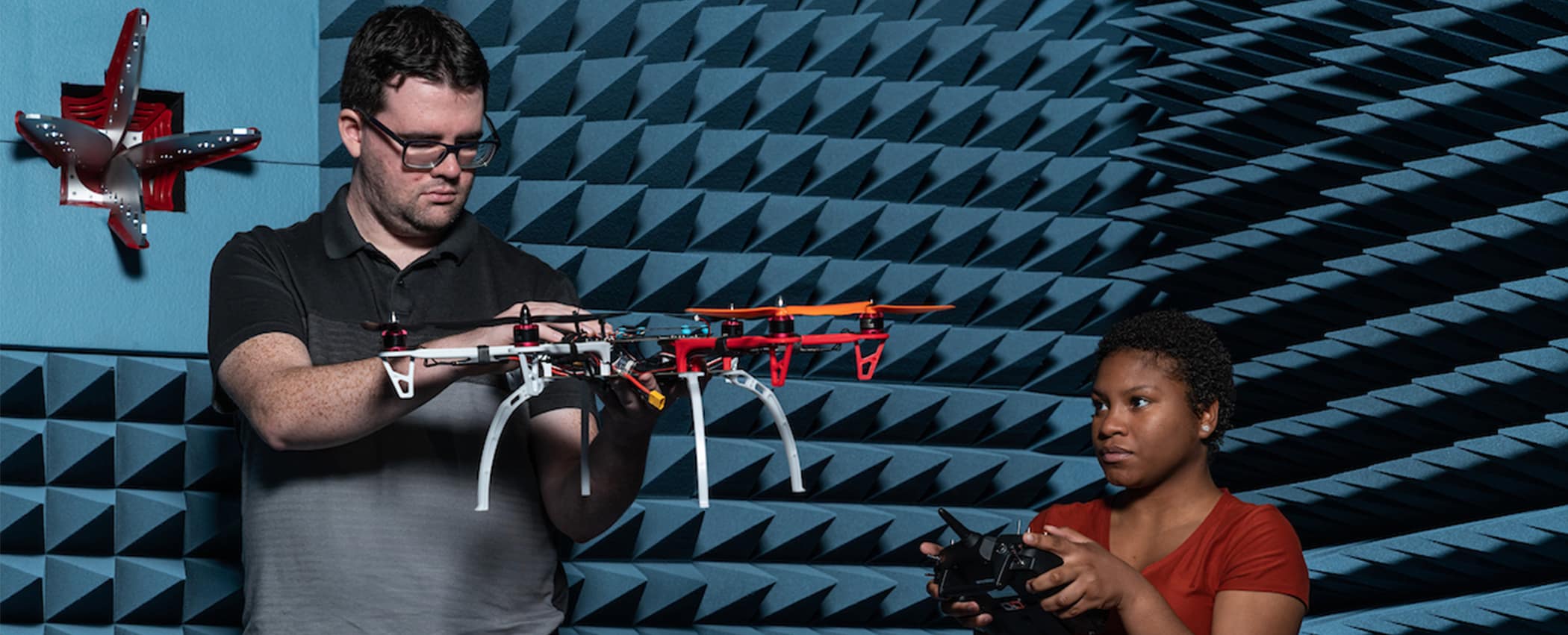Students in the Department of Department of Electrical Engineering and Computer Science work on — and even develop — the technologies that make air and space flight possible. From navigation and control systems to the electroluminescent dimming of the windows in a 787 airliner, these technologies involve embedded computers like those found in mobile phone and flight control systems.
There is always something new being developed in this area, and students get to work with the latest systems in electronics and the digital world.
The EECS Department has four undergraduate programs: Computer Engineering, Computer Science, Electrical Engineering, and Software Engineering. Each of these programs involves a high degree of systems thinking: understanding how the individual parts of a complex system fit together to make a working whole. Students don’t just work within their own discipline, they interact with other disciplines, too, just like real-world engineers.
Visit the website of the Department of Electrical Engineering and Computer Science
Submissions from 2022
Height Information Aided 3D Real-Time Large-Scale Underground User Positioning, Houbing Song, Chengkai Tang, Cunle Zhang, Lingling Zhang, and Yi Zhang
Submissions from 2021
Spatio-Temporal Data Mining for Aviation Delay Prediction, Kai Zhang, Houbing Song, Yushan Jiang, and Dahai Liu
Submissions from 2018
Hot Wire Anemoteter, Michael S. Potash and Albert D. Helfrick
Submissions from 2016
System and Method for Location of Aircraft, Albert D. Helfrick
Hot Wire Anemometer, Michael S. Potash and Albert D. Helfrick
Submissions from 2014
Keeping the Skies Safe, Massood Towhidnejad and Andrew J. Kornecki
Measuring Security: A Challenge for the Generation, Janusz Zalewski, Steven Drager, William McKeever, and Andrew J. Kornecki
Submissions from 2013
Fault Tree Analysis for Safety/Security Verification in Aviation Software, Andrew J. Kornecki and Mingye Liu
Development of a Master of Software Assurance Reference Curriculum, Andrew J. Kornecki, James McDonald, Julia H. Allen, Mark Ardis, Nancy Mead, Richard Linger, and Thomas B. Hilburn
Submissions from 2012
The Allen Telescope Array Search for Electrostatic Discharges on Mars, Marin M. Anderson, Andrew P.V. Siemion, William C. Barott, Geoffery C. Bower, Gregory T. Delory, Imke de Pater, and Dan Werthimer
Submissions from 2011
Real-Time Beamforming Using High-Speed FPGAs at the Allen Telescope Array, William C. Barott, Oren Milgrome, Melvyn Wright, David MacMahon, Tom Kilsdonk, Peter Backus, and Matt Dexter
Submissions from 2010
Graduate Curricula in Software Engineering and Software Assurance: Need and Recommendations, T. B. Hilburn and Andrew J. Kornecki
Hardware Certification for Real-time Safety-critical Systems: State of the Art, Andrew J. Kornecki and Janusz Zalewski
Submissions from 2009
Are Wireless Sensors Feasible for Aircraft?, Thomas Yang, Jianhua Liu, and Ilteris Demirkiran
Submissions from 2008
Dependable and Certifiable Real-World Systems – Issue of Software Engineering Education, Andrew J. Kornecki
Submissions from 2006
A Gradient-Based Optimum Block Adaptation ICA Technique for Interference Suppression in Highly Dynamic Communication Channels, Wasfy B. Mikhael and Tianyu Yang


